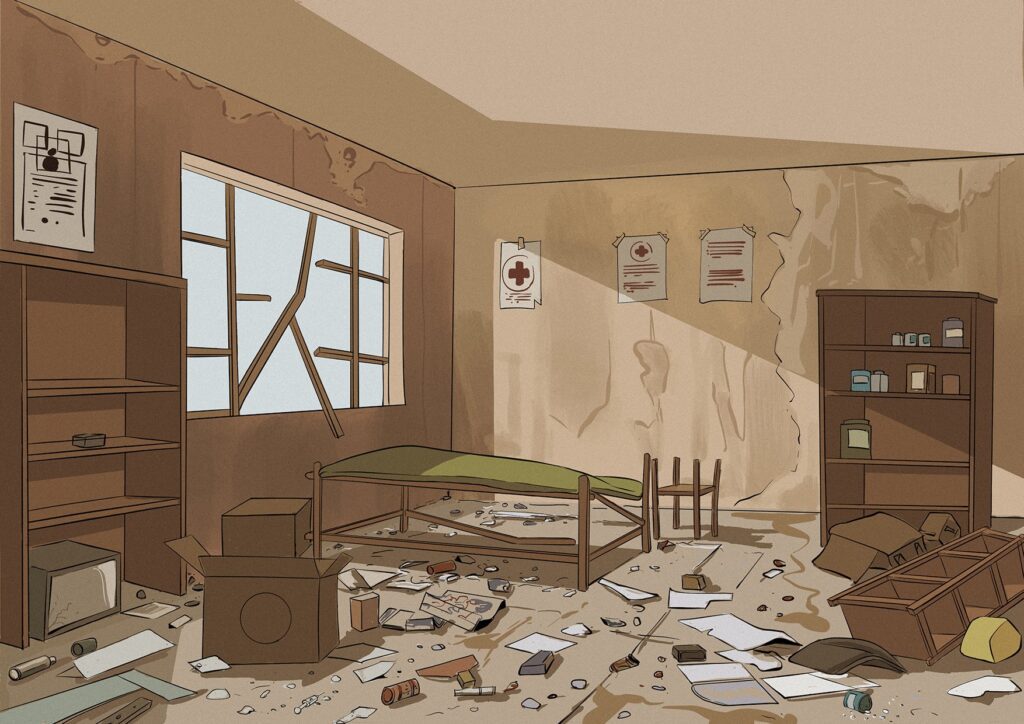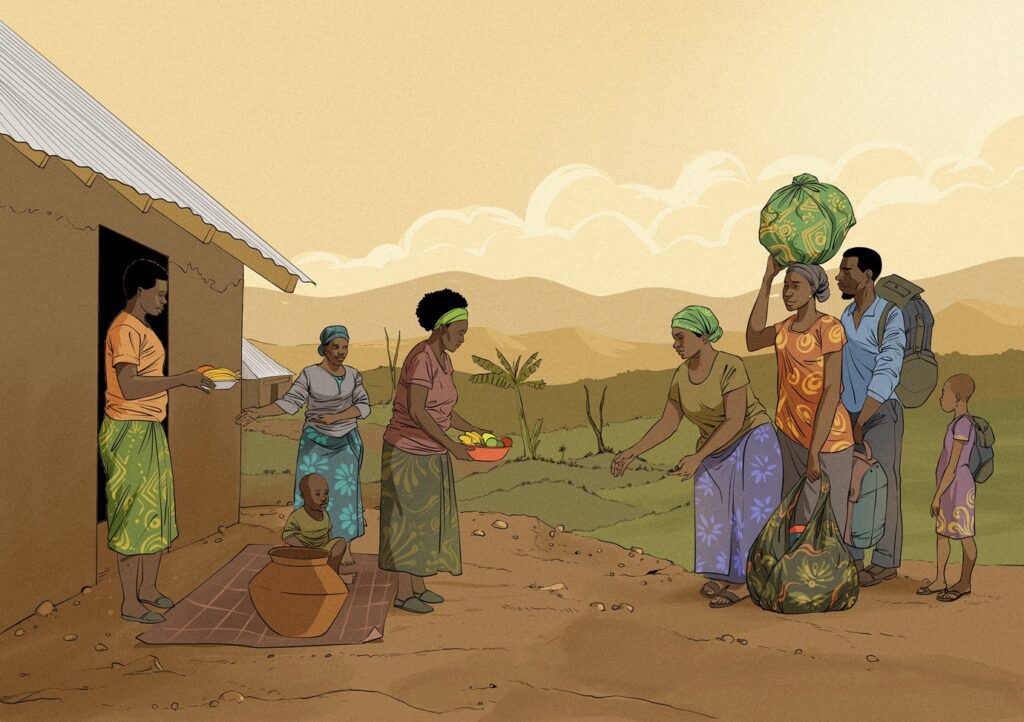The reporting was produced by local journalists, whose identities are being withheld for their safety.
Walikale is one of several territories the M23 has been fighting over during a nearly four-year insurgency that has displaced millions of people, echoing the devastating wars that blighted DRC in the late 1990s and early 2000s.
But the sprawling territory – like most other provincial areas occupied by the M23 and its Rwandan backer – has received little attention compared with the larger cities and urban areas that have been taken over by the rebels. “They are here, and we have no choice but to live with them,” said a local resident. “They sow terror so that they will be listened to.”
It isn’t for lack of incident.
Interviews by a local reporter from Walikale — contributing to a series by The New Humanitarian on rebel rule away from big cities — reveal how villages in the territory have been reshaped since the rebels took control earlier this year.
Residents say local community leaders and institutions have been put to the service of the M23, who are imposing their own taxation system and compelling people to provide labour for military services.
Many reported persistent human rights abuses, while describing massive humanitarian suffering as the local economy is disrupted and health centres are impacted by fighting.
At the same time, some said the rebels have undertaken projects like road-building that have improved daily life, and which highlight the complexities and nuances of rebel rule.
“We must admit that, thanks to them, we can now travel easily by motorcycle or vehicle because they brought machinery to mend the road,” said a resident of the Kashebere locality. “This has really impacted the daily lives of the population.”
“We have become their workers”
Led mostly by Congolese Tutsis, the M23 initially justified its insurgency – one of several currently roiling DRC – by citing a broken peace deal and discrimination against marginalised Tutsi communities in the east.
But the group has since expanded its objectives, forming a political wing that includes national figures who are calling to overthrow the government of President Félix Tshisikedi, even amid ongoing peace processes.
Earlier this year, the rebels, supported by thousands of Rwandan troops, seized the biggest cities in the east – Goma and Bukavu. They are home to millions of people, who now face massive and near-daily human rights abuses.
But away from the media spotlight, provincial areas like Walikale – which the rebels first entered in March – have also experienced massive turmoil, even for communities used to predatory armed groups and repressive governments.
The upheaval has been especially acute in the areas of Kashebere and Kibati. They are gateways to neighbouring Masisi territory, and provide strategic access to different parts of Walikale, a vast territory studded with hundreds of villages and mines.
Residents of the area said they have been forced into hard labour – something they had not experienced under previous administrations, and which has driven many men to leave for areas under the control of the Congolese army.
In Kikamata Two, a village between Kashebere and Kibati, residents said they are summoned by the rebels each week to haul firewood, fetch water, and dig rifle pits in strategic locations.
“They call the village chiefs to their camps when there is work to be done,” said one resident, who, like all sources in this story, is not being named for security reasons. “They intimidate them so that they, in turn, go and order the population. We have become their workers.”
A human rights activist who left Kashebere for a government-held zone said locals accused of crimes are often arrested without trial and subjected to torture in detention. “They put people in pits, where there is water to punish them,” he said.
The activist added that many of those arrested do not return. “We believe that they kill them, or send them to their training centres to become fighters, which is forced recruitment,” they said.
“One day, the perpetrators will be held accountable”
Many civil society activists and journalists in M23-held parts of Walikale said they have left to protect themselves. Others said they continue to document events in secret, hoping to one day publish what they are witnessing.
Community leaders with customary authority said the rebels have not overhauled the local administrative system as they have done in other M23-held territories where local leaders have reportedly been replaced.
Still, one leader said he and his colleagues must seek rebel approval before making any important decisions. He said they are often gripped by fear, anticipating they might be replaced by figures loyal to the movement.
A former government tax officer who now works for the M23 said that in Kashebere and Kibati, all taxes are now paid to the rebel administration. “The population is forced to pay or face arrest and punishment,” he said.
The officer said the rebels have introduced new land taxes in rural areas where none existed before, and have doubled the fees for transporting cattle from Masisi to Walikale.
A member of a local butchers’ association said the increased taxes have been passed on to consumers, prompting families to eat less meat and more vegetables — cutting into his income and reshaping people’s diets.
The collector said he had no choice but to “follow their instructions” and impose the levies, which form part of a wider system of taxation that funds the rebels, alongside profits from mineral extraction and Rwandan government support.
Many said health centres need especially urgent support.

The two main wards at one important health centre have 10 beds each, but patients have been arriving in large numbers due to cholera and malaria outbreaks, doctors there said. Many are forced to sleep on the floor or head home without care.
Health facilities are also experiencing a shortage of medicine after their stocks were looted by the warring parties during recent clashes in the area, said the managers of various centres.
“What the warring parties weren’t able to transport, they destroyed,” said an administrator of one centre. He said the clinic’s usual humanitarian partners have left due to the security situation.
With some health facilities forced to close, sick and injured people often have to walk long distances in search of clinics that are open and stocked with medicine, health workers said.
Not all make it. The New Humanitarian heard of a cancer patient who recently died on the way to a clinic – while being carried on a makeshift stretcher. Pregnant women are also increasingly giving birth on the road as they try to reach care.
Surviving through solidarity
The needs are also critical for displaced people sheltering in Walikale – many of them having fled clashes between the M23, the Congolese army, and pro-government militias in neighbouring Masisi.
Several displaced people said they have received no support from international humanitarian agencies.

“To find food, we are forced to work for the locals,” said a father-of-seven from Masisi. “Sometimes, the work we do doesn’t match the amount of food we’re given, but we have no choice, otherwise our children will starve.”
Desperate for food, a displaced man in his forties was recently killed in Kibati while gathering crops in a dangerous area during a pause between clashes between the M23 and pro-government militias, according to his wife.
She said she didn’t know how he died – only that his body was later found in a fish pond by others returning from their fields. “We fled our village together, but I’m going to have to go back without him,” she said, through tears.
Residents in areas where displaced people have been gathering – Kashebere, Kibati, Muba, and Mikumbi – said their experience of past wars has led them to share scant resources with displaced people, and provide them shelter in their houses.
“We have welcomed other displaced families from Masisi,” said a host in Kashebere. “We accept to suffer together because in life, you never know – one day, we might also flee our area here and find ourselves in their home.”
Another host offered a proverb to capture the spirit of solidarity keeping people alive through the rebel occupation: “Caterpillars on the same tree survive together by sharing the leaves they find on a branch,” they said.
This report was coordinated by Claude Sengenya in Butembo, eastern DRC. Editing by Claude Sengenya and Philip Kleinfeld of the New Humanitarian
